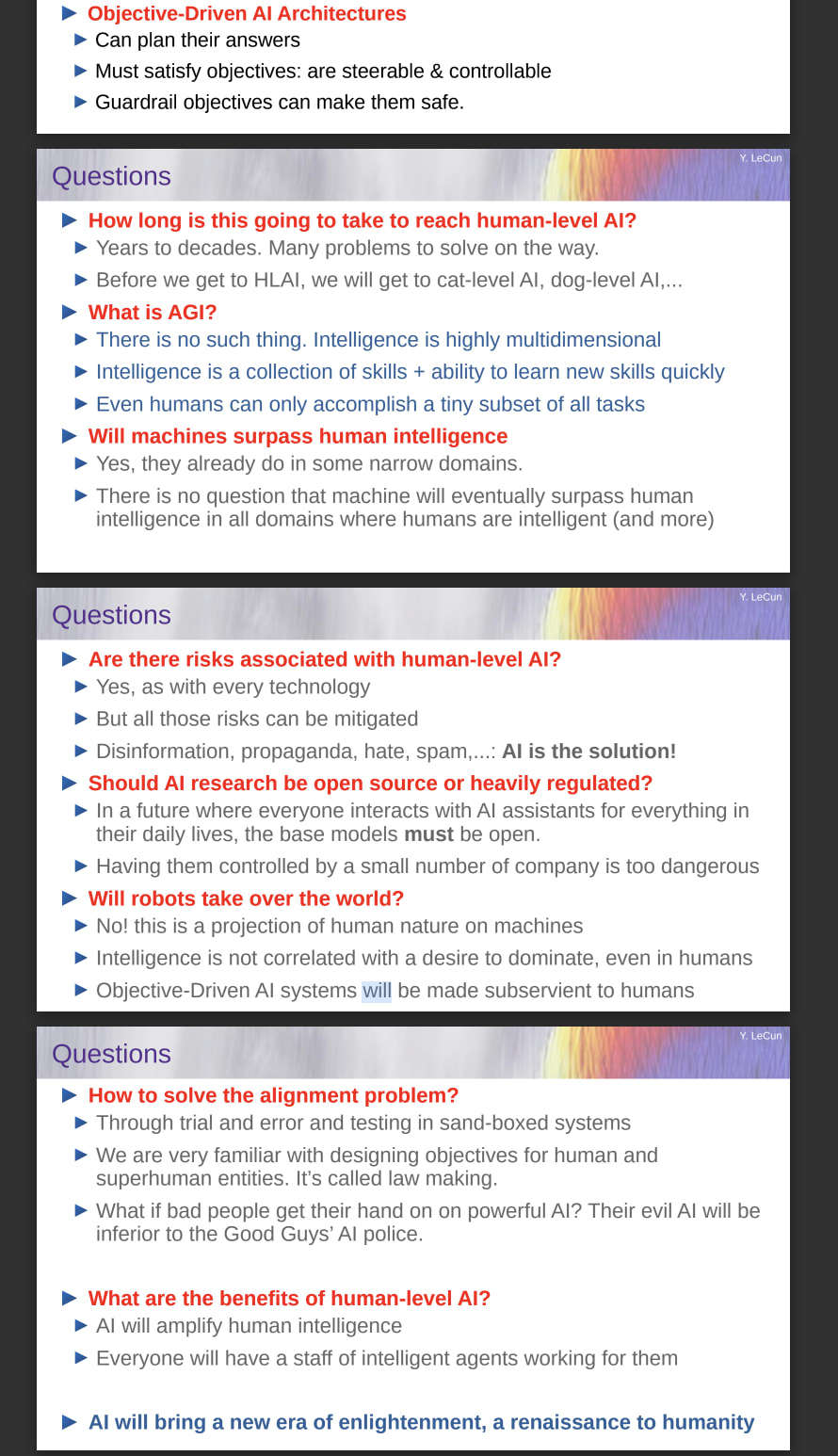Yann recently gave a presentation at MIT on Objective-Driven AI with his specific proposal being based upon a Joint Embedding Predictive Architecture.
He claims that his proposal will make AI safe and steerable, so I thought it was worthwhile copying the slides at the end which provide a very quick and accessible overview of his perspective:
Here's a link to the talk itself.
I find it interesting how he says that there is no such thing as AGI, but acknowledges that machines will "eventually surpass human intelligence in all domains where humans are intelligent" as that would meet most people's definition of AGI.
I also observe that he has framed his responses to safety on "How to solve the alignment problem?". I think this is important. It suggests that even people who think aligning AGI will be easy have started to think a bit more about this problem and I see this as a victory in and of itself.
You may also find it interesting to read Steven Byrnes' skeptical comments on this proposal.

It's important to note that Lecun and Andreessen (Facebook/Meta board member) are well-established to be currently conducting an infowar against AI safety- they're pretty committed to accelerating AI and making sure their company, Facebook/Meta, is the company that gets maximum advantage in that race; at all costs, and by any means. As another example, releasing SOTA open-source AI models in order to advance open-source AI and leverage their dominance there, even though open-source AI allows companies in China and other countries to develop better engineering expertise to compete with American AI companies.
Currently, Facebook seems to be competing against OpenAI, Deepmind, and Anthropic for influence over AI policy in DC. Since Facebook/Meta's closed-source systems are lagging, their strategy seems to be using AI safety as a sacrificial lamb in order to appeal to pro-american-innovation norms that have been very dominant in DC for a while. Their edge there is being the company that credibly committed to steering clear of all that confusing AI safety hogwash.
Obviously, there's much more to it than what I've said here, like investor confidence and other complex and controversial factors which I'm not currently willing to talk about in a public comment. There's seriously a lot going on with Facebook/Meta and AI, you could spend years researching that rabbit hole and you'd never stop finding things worth finding.
But if anyone decides to write a list of detailed explanations of why Lecun and Andreessen's arguments are obvious horseshit, you should expect them to follow up by throwing substantial time and money into generating more horseshit counterarguments tailored around your arguments; specifically to look good to policymakers in DC and other influential people who can't or won't go into details about the problem itself.
The nice thing is that Lecun and Andreessen seem to be unwilling or unable to lie about superintelligence being feasible at all, they have to admit it's a real situation, so they can't just do the usual thing where they appeal to common sense and say it's all a sci-fi grift. AI safety and Facebook/Meta are debating on even ground here, the vast numbers of people who can't/won't entertain the idea of vastly-smarter-than-human AI aren't going to be participants in either side.
It really shouldn't surprise people to see high-level figures from Facebook/Meta, of all places, being really well-versed at information warfare; but many people are still approaching this like an honest debate, which it stopped being a long time ago.
I don't think the comment you're responding to is doing this; I think it's straightforwardly accusing LeCun and Andreesen of conducting an infowar against AI safety. It also doesn't claim that they don't believe their own arguments.
Now, the "deliberate infowar in service of accelerationism" framing seems mostly wrong to me (at least with respect to LeCun; I wouldn't be ... (read more)